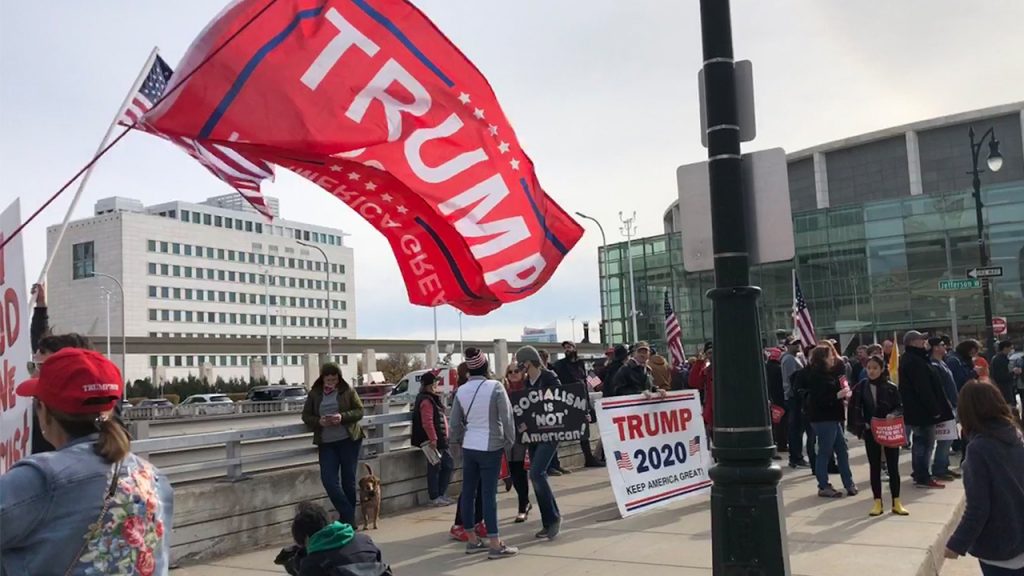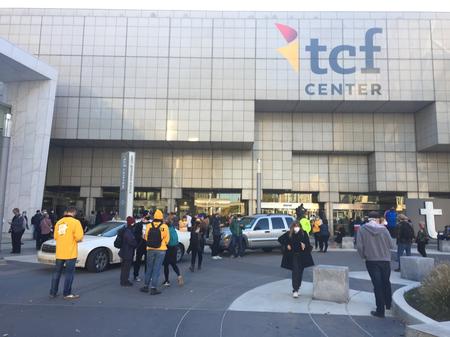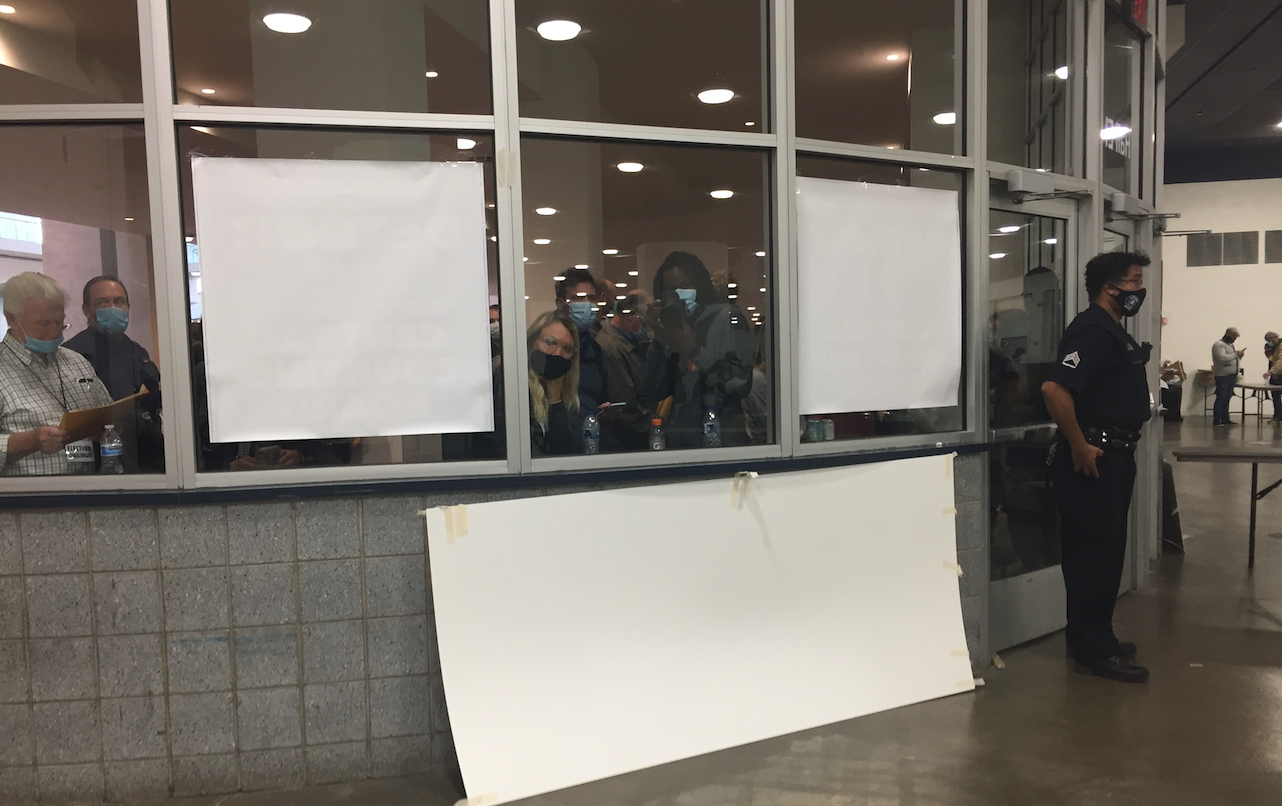Detroit Poll Supervisors Call Trump’s Allegations of Election Fraud ‘Absolutely Untrue’
Donald Trump refuses to concede the presidential election and his campaign filed a flurry of lawsuits over how the vote was counted in Detroit. Chris Thomas, who helped oversee voting and poll challenges, weighs in on what happened during Detroit’s vote count.

Donald Trump supporters gather at the TCF Center in downtown Detroit on Nov. 4, 2020.
At least three lawsuits have been filed in Michigan over the vote count in the presidential election.
One filed in Wayne County Circuit Court contains affidavits from four GOP poll challengers and a City of Detroit employee. It claims early voters were encouraged to vote for Democrat Joe Biden and that election officials prevented Republican observers from watching the process.
Other than affidavits, the suits do not offer any actual evidence to support the allegations.
Earlier lawsuits demanding that workers stop counting votes were dismissed by the Michigan Court of Claims and the Wayne County Circuit Court.
LISTEN: Former Michigan Director of Elections Chris Thomas discusses what happened during the ballot count at the TCF Center following the election.

Legal experts suggest the lawsuits could be designed to delay the certification of the election results, which could offer an opening for majority Republican state legislatures to declare the results in question and appoint their own slate of electors.
During the weekend Michigan’s Republican-controlled state legislature held almost unprecedented hearings to subpoena election records, which experts say could lay the groundwork for Michigan lawmakers to conceivably, albeit very abruptly, change state law in order to appoint electors.
But a man who oversaw voting and poll challenges in Detroit says Michigan legislators would end their political careers if they overrode state voters in such a manner.
That man, Michigan’s former state director of elections Chris Thomas, served for almost four decades under governors from both sides of the political aisle. Thomas says he and Trump have vastly differing views about the legitimacy of the ballot count in the 2020 presidential election.
Counting Votes in Trump’s ‘Most Corrupt’ City
When President Trump emerged for only the second time publicly after Election Day, he again alleged massive fraud among the mail-in ballots he’d vilified for months. The president claimed there were irregularities in several states and in two cities in particular: “Detroit and Philadelphia, known as two of the most corrupt political places anywhere in our country. Easily,” said Trump. “They cannot be responsible for engineering the outcome of a presidential race, a very important presidential race.”
Thomas, who was advising poll workers at the TCF Center during the ballot count, says he saw no “engineering” of the presidential race. According to him, it was a pretty smooth process for the most part.
“[The challengers] were not aggressive. They were just loud. They thought that these were all, you know, really terrible ballots for some reason or another. We actually demonstrated in the computer what we were talking about. And at that point they thanked us and they declined to challenge them.” — Chris Thomas, former Michigan Director of Elections
“We started on Wednesday receiving these ballots from the tables where each of the boards were,” Thomas said. One glitch poll workers encountered was challenges scanning the barcodes on the ballots. “They couldn’t scan the envelope. There’s a barcode on the address label and it wouldn’t scan in,” says Thomas. “[Ballots] are pre-scored so they can fold. And when they come out of their envelope they’re an accordion. For scanners of any nature, they need to be as flat as possible before they go through the tabulator.”
Thomas says Republican poll observers and challengers looked suspiciously at the ballots at first.
“One group of challengers had us lay them all out on the table and they wrote the ballot numbers down. Why? I’m not sure. But they did, which is fine. They asked for that, we accommodated that. We spread them all out, probably took an hour or two. [The challengers] were not aggressive. They were just loud. They thought that these were all, you know, really terrible ballots for some reason or another. We actually demonstrated in the computer what we were talking about. And at that point they thanked us and they declined to challenge them,” says Thomas.
Thomas says any real angst he saw happened among poll workers, not challengers.
“They were irritated at times by the challengers. We’re in a time of COVID, right? People aren’t used to stepping into a building with 1,300 people in one room, albeit a big room. So there’s some real jitters, particularly now with skyrocketing cases. And when you’re in there with all these people, many of them talking very loudly, pulling their mask down below their noses, it’s unnerving for a lot of people,” Thomas said.
Allegations About Access
The President of the United States, however, saw the counting center as much more than a place of coronavirus jitters. He claimed, without evidence or substantiation, that the facility was the scene of a crime.
“Our campaign has been denied access to observe any counting in Detroit,” Trump said from the White House two days after the election. “Detroit is another place I wouldn’t say has the best reputation for election integrity. One major hub for counting ballots in Detroit covered up the windows, again, with large pieces of cardboard. And so they wanted to protect and block the counting area. They didn’t want anybody seeing the counting even though these were observers who were legal observers [who were] supposed to be there.”
“Republicans were there the entire time. And if they left, they left on their own accord. Nobody threw them out.” — Chris Thomas, former Michigan Director of Elections
Thomas, who was there, strongly disagrees.
“That’s absolutely untrue. Republicans were there the entire time. And if they left, they left on their own accord. Nobody threw them out,” Thomas said. “There were maybe well over 200 Republicans in the room. We have the logs, they all signed in. And they were full up, their quota was more than fully filled. I saw a whole group of 30 of them came in at one time. And it’s just before it got closed down.”
Independent reports say some GOP observers had gathered outside TCF Center at the time while a large Trump float circled the building. The observers were complaining they were being prevented from entering.
“There was no room, there is no way they’re getting in there,” Thomas says. “There were Democrats outside that room. There were ACLU, AFL-CIO challengers out there that could not get back in. It was not just Republicans.”
‘Nobody Asked’ Where Ballots Came From
Trump contends that even challengers already inside the TCF Center had problems, claiming “Poll workers in Michigan were duplicating ballots. But when our observers attempted to challenge the activity, those poll workers jumped in front of the volunteers to block their views so that they couldn’t see what they were doing. And it became a little bit dangerous.”
Thomas says there’s nothing nefarious involved. “There’s a number of reasons you would duplicate [ballots],” says Thomas “The biggest group we duplicate are the military and overseas voters, because they get a ballot emailed to them and it’s a facsimile of a ballot. It’s not anything that can be read in the tabulator. And so those have to be totally transposed over to a regular election ballot. That’s common. We get ballots that are torn or ripped that aren’t going to go through the tabulator. Those need to be remade, duplicated,” he said.
Thomas says at the time, challengers did not seem especially concerned.
“I didn’t see anything that was dangerous,” Thomas said. “I saw a couple raised tempers at times, I walked into a couple of them. I got people calmed down. There were times when [challengers] said they couldn’t see. I didn’t really view that as intentionally blocking the view. But they were not physical. There was no threatening, none of that.”

Yet Trump continues to claim that the process poses a threat to not only his presidency, but democracy itself. “In Detroit, there were hours of unexplained delays in delivering many of the votes for counting. The final batch did not arrive until four in the morning. And even though the polls closed at eight o’clock… the batches came in and nobody knew where they came from,” he said.
“Those were the ballots received on Election Day [from] drop boxes, from the mail and in the clerk’s office, and in the satellite offices. It happens every election.” — Chris Thomas, former Michigan Director of Elections
Thomas literally laughs at that allegation.
“Nobody asked. They don’t ask. I’m serious. I mean, they just don’t ask,” Thomas said. “In fact, at the time, nobody said a word. The place was quieted down, I’d come back to work at 2:30 in the morning. There’s a van that showed up, the city van that was used to bring the ballots. They brought them in there. There were 16,000 in it. No one walked up and said, ‘What the hell’s that?’ Nobody said anything about it. Later in the day… the lawyers were coming through. I had a long conversation [with one of them.] He asked me about the 38,000 [ballots.] I said there was no 38,000, it was 16,000… Those were the ballots received on Election Day [from] drop boxes, from the mail and in the clerk’s office, and in the satellite offices. It happens every election,” Thomas said.
Trusted, accurate, up-to-date
WDET is here to keep you informed on essential information, news and resources related to COVID-19.
This is a stressful, insecure time for many. So it’s more important than ever for you, our listeners and readers, who are able to donate to keep supporting WDET’s mission. Please make a gift today.
